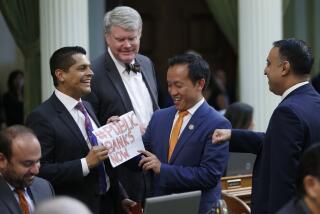Activists Get Partial Win in Mitsui Dispute
- Share via
In a partial victory for consumer activist groups, the Federal Reserve Board said Wednesday that it may hold a public hearing on how well Mitsui Bank Ltd. and its California subsidiary serves the U.S. communities from which it takes its deposits.
The decision comes months after more than 30 consumer groups protested Mitsui’s proposed merger with Taiyo Kobe Bank Ltd. to become the world’s largest bank. The protesters claimed Tokyo-based Mitsui and its Los Angeles-based subsidiary, Mitsui Manufacturers Bank, violated the 1977 federal Community Reinvestment Act (CRA) by engaging in “redlining,” refusing to provide residential, commercial or consumer loans to blacks, Latinos and low-income people.
The act requires bank regulators to examine whether a bank is meeting community credit needs when it seeks to acquire another bank.
The ruling is the first time in California history that the federal agency has called for a hearing on a foreign-owned bank’s community reinvestment activities here, said Robert Gnaizda, head of Public Advocates, a San Francisco public interest law firm and an attorney for the Greenlining Coalition, a group that challenged the merger.
The Fed in effect is saying Mitsui’s community reinvestment is “inadequate,” Gnaizda said. “We are extremely pleased with the Federal Reserve’s get-tough attitude,” he said.
The Fed said it had no jurisdiction over approving the merger of Mitsui and Taiyo Kobe, because both are based in Japan. However, the Fed did approve an application by a merged Mitsui and Taiyo Kobe to acquire Taiyo Kobe’s New York-based trust company.
Jerry W. Johnston, president of Mitsui Manufacturers, said: “We are quite confident that our CRA record . . . will be seen by the board.”
Mitsui Manufacturers is currently developing a plan that details how it meets community needs. This plan, if it shows community reinvestment activities that are deemed adequate by the Fed, presumably could result in a cancellation of the hearing.
More to Read
Inside the business of entertainment
The Wide Shot brings you news, analysis and insights on everything from streaming wars to production — and what it all means for the future.
You may occasionally receive promotional content from the Los Angeles Times.










